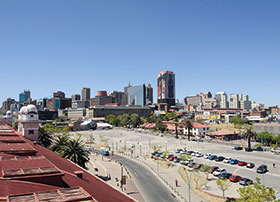

Siemens believes a company can only truly succeed if it helps to fulfil the needs of the society in which it operates. Besides helping to drive a country’s economic growth, the technology giant insists that a business should also add lasting value to the community.
To this end, Siemens recently invested in a study called “In South Africa. For South Africa: The Business to Society Report” to determine its contribution to South African society.
“Companies like Siemens must demonstrate how their business interests are aligned with the country’s national development agenda, and play an active role in economic and societal development,” says Sabine Dall’Omo, CEO of the Siemens Southern and East Africa operations. “This requires us to measure corporate success by much more than just profit. In South Africa, we are putting ourselves under scrutiny and trying to understand our role and responsibilities to society in a more structured and complete manner.
“We recognised almost immediately that only by understanding what is important to South Africa can we really evaluate our place in society. Rather than viewing the country from the perspective of Siemens and its own operations, we looked inward at Siemens from the perspective of South Africa and its particular social, economic and political circumstances.”
The results are contained in the insightful Siemens: Business to Society Report.
What matters to South Africa?
South Africa is a country recovering from injustice, inequality and uneven development. There is an urgent need to develop new infrastructure, to create industrial opportunities and employment, and to tackle endemic poverty and inequality. Through its external research and analysis Siemens identified six key pillars that set the focus of its impact assessment and provided the framework to measure the company’s contribution to South Africa:
• Driving the economy: South Africa aims to develop an economy which provides security, fulfilment and a better quality of life to its people. Yet there are currently 23 million people living in poverty. Government aims to grow the economy to 2,7 times its current R3,8tn and to expand sectors such as mining, manufacturing, automotive and transport, which between them account for around 25% of GDP.
• Developing local jobs and skills: The creation of jobs and skills is an imperative in a country with five million unemployed people. The skills shortage in South Africa is holding back growth, with nearly half a million private sector posts unfilled. The National Development Plan aims for the creation of 11 million new jobs by 2030.
• Value-adding innovations: South Africa needs innovation to build its economy. It is innovation which will help to overcome the power crisis, increase the supply of renewable energy, and make industry more globally competitive through automation and digitalisation. Innovation also creates more skilled jobs and stimulates the growth of small businesses.
• Sustaining the environment: South Africa is aiming for growth combined with environmental responsibility. It currently has some of the highest carbon emissions in the world, due largely to dependence on coal for power generation, but aims to reduce emissions by 34% by 2020. Water is a scarce resource in South Africa, the 30th driest country on earth. Each year, it generates 60 million tons of general waste, of which more than 90% ends up in landfill.
• Improving quality of life: Healthy and fulfilled people are able to build healthy and equitable societies. But more than 10% of the SA population has HIV/AIDS or related diseases, and total life expectancy is a relatively modest 58,3 years. The South African health system is ranked by the World Health Organisation at 175 out of 191 countries. Education is recognised as being critical to South Africa’s success, yet it is ranked 146 out of 148 countries in education quality, and last in maths and science.
• Supporting transformation: South Africa is being rebuilt out of the apartheid legacy, and empowerment of the previously disadvantaged is essential to foster a more inclusive society. This requires a massive long-term commitment by business to support transformation through Broad-Based Black Economic Empowerment (B-BBEE), clean and ethical business practices and support for small and medium size enterprises businesses.
Against this backdrop, Siemens developed an objective customised methodology, based on the Measuring Impact Framework of the World Business Council for Sustainable Development (WBCSD), to measure and assess its contribution to South Africa.
To obtain the detailed results of the Siemens Business to Society Report, readers can register to download the entire document at www.siemens.co.za/en/about_us/form.htm
For more information contact Jennifer Naidoo, Siemens Southern Africa, +27 (0)11 652 2795, [email protected], www.siemens.co.za
| Tel: | +27 11 652 2000 |
| Email: | [email protected] |
| www: | www.siemens.co.za |
| Articles: | More information and articles about Siemens South Africa |

© Technews Publishing (Pty) Ltd | All Rights Reserved